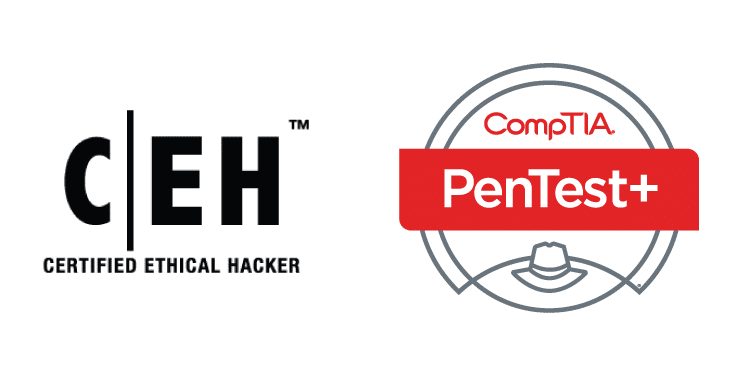Introduction
In the ever-evolving landscape of cybersecurity, certifications play a crucial role in validating an individual's skills and knowledge. Two of the most respected certifications in the field are the Certified Ethical Hacker (CEH) and CompTIA Pentest+. Both of these certifications focus on penetration testing and ethical hacking but have distinct differences in their approach, content, and industry recognition. This article will provide a comprehensive comparison of CEH and Pentest+, helping you decide which certification is right for your career path.
Overview of CEH
What is CEH?
The Certified Ethical Hacker (CEH) certification, offered by the International Council of E-Commerce Consultants (EC-Council), is one of the most recognized certifications in the cybersecurity industry. It focuses on identifying vulnerabilities in computer systems and understanding how to secure them.
CEH Curriculum and Exam Details
The CEH certification covers a broad range of topics, including:
- Ethical hacking introduction: Understanding the role and responsibilities of an ethical hacker.
- Reconnaissance techniques: Gathering information about the target system.
- Scanning networks: Identifying live systems and open ports.
- Gaining access: Exploiting vulnerabilities to access systems.
- Maintaining access: Ensuring continued access to the system.
- Covering tracks: Techniques to hide the presence and actions of the hacker.
The CEH exam consists of 125 multiple-choice questions, and candidates have four hours to complete it. The exam tests a wide range of skills, from theoretical knowledge to practical hacking techniques.
CEH Prerequisites and Cost
Candidates for the CEH certification must have at least two years of work experience in the information security domain or complete an official EC-Council training. The cost of the CEH exam is around $850, with additional costs for training materials and courses.
Overview of Pentest+
What is Pentest+?
The CompTIA Pentest+ certification is a newer addition to the field of cybersecurity certifications, focusing specifically on penetration testing. It is designed to validate the skills required to identify, exploit, report, and manage vulnerabilities on a network.
Pentest+ Curriculum and Exam Details
The Pentest+ certification includes the following domains:
- Planning and Scoping: Defining the scope of penetration testing activities.
- Information Gathering and Vulnerability Identification: Techniques to gather information and identify vulnerabilities.
- Attacks and Exploits: Performing attacks and exploiting vulnerabilities.
- Reporting and Communication: Documenting findings and communicating results to stakeholders.
- Tools and Code Analysis: Using tools and scripts for penetration testing.
The Pentest+ exam is composed of a maximum of 85 questions, including multiple-choice and performance-based questions, and candidates have 165 minutes to complete it.
Pentest+ Prerequisites and Cost
There are no formal prerequisites for the Pentest+ certification, although it is recommended that candidates have at least three to four years of information security experience. The exam costs approximately $404.
CEH vs. Pentest+: Key Differences
Focus and Depth of Content
CEH provides a comprehensive overview of various hacking techniques and tools, with a strong emphasis on the theoretical aspects of ethical hacking. It covers a wide range of topics, making it suitable for those who want a broad understanding of cybersecurity.
Pentest+, on the other hand, is more focused on practical penetration testing skills. It emphasizes hands-on experience and real-world scenarios, making it ideal for professionals who want to specialize in penetration testing.
Industry Recognition and Career Impact
The CEH certification is well-established and recognized globally, often considered a benchmark for ethical hacking skills. It is particularly valued by employers in government and large corporations.
Pentest+ is gaining recognition and is respected for its practical approach. It is ideal for roles that require in-depth penetration testing skills, such as penetration testers, vulnerability assessment analysts, and network security specialists.
Cost and Time Investment
The CEH certification is more expensive, with higher costs for the exam and training. It also requires prior work experience or completion of official training, which can be a barrier for some candidates.
Pentest+ is more affordable and accessible, with no formal prerequisites. This makes it a cost-effective option for professionals looking to enter the field of penetration testing.
Choosing the Right Certification for You
Consider Your Career Goals
If your goal is to have a broad understanding of ethical hacking and cybersecurity, and you aim to work in roles that require a recognized certification, CEH may be the better choice. It is particularly valuable for those looking to work in government or large enterprises.
If you are focused on becoming a specialized penetration tester and want to gain practical, hands-on experience, Pentest+ is likely the better fit. It provides a more focused curriculum and is designed to prepare you for real-world penetration testing challenges.
Evaluate Your Experience and Resources
Consider your current experience and resources. If you have the necessary work experience or can afford the cost of CEH training, the CEH certification can be a valuable investment. However, if you are newer to the field or looking for a more affordable option, Pentest+ offers a practical and cost-effective pathway.
Assess Industry Demand
Research the demand for each certification in your target job market. While both certifications are respected, certain regions or employers may prefer one over the other. Understanding the specific requirements of your desired career path can help you make an informed decision.
Conclusion
Both CEH and Pentest+ certifications offer valuable skills and knowledge for cybersecurity professionals. Your choice between the two should be guided by your career goals, current experience, and the specific demands of the job market. By carefully considering these factors, you can select the certification that best aligns with your aspirations and sets you on a path to success in the dynamic field of cybersecurity.





0 comments:
Post a Comment